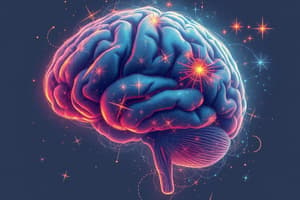Podcast
Questions and Answers
At what age does late adulthood begin?
At what age does late adulthood begin?
- 65 years old (correct)
- 75 years old
- 55 years old
- 70 years old
What percentage of the U.S. population are considered elderly, aged 65 and above?
What percentage of the U.S. population are considered elderly, aged 65 and above?
- 10%
- 25%
- 17% (correct)
- 30%
Which category best describes the majority of individuals in late adulthood?
Which category best describes the majority of individuals in late adulthood?
- Old-old with moderate health issues
- Those unable to care for themselves
- Young-old with few health problems (correct)
- Oldest-old with serious health problems
What is a common misconception about older adults stemming from ageism?
What is a common misconception about older adults stemming from ageism?
Which theory of aging suggests that our bodies wear out after prolonged use?
Which theory of aging suggests that our bodies wear out after prolonged use?
What impact does regular exercise have on elderly individuals?
What impact does regular exercise have on elderly individuals?
What sleep pattern changes are typical in late adulthood?
What sleep pattern changes are typical in late adulthood?
How has the average life expectancy changed from 1950 to 2020?
How has the average life expectancy changed from 1950 to 2020?
What cognitive change increases in elderly individuals, making it difficult for them to react quickly?
What cognitive change increases in elderly individuals, making it difficult for them to react quickly?
Which type of memory is generally more affected by aging?
Which type of memory is generally more affected by aging?
How does stereotype threat impact memory in older adults?
How does stereotype threat impact memory in older adults?
Which of the following statements about creativity in late adulthood is true?
Which of the following statements about creativity in late adulthood is true?
What factor does NOT contribute to an elder being perceived as wise in their community?
What factor does NOT contribute to an elder being perceived as wise in their community?
What happens to vocabulary as people enter late adulthood?
What happens to vocabulary as people enter late adulthood?
What cognitive aspect is linked to the loss of reaction time in elderly drivers?
What cognitive aspect is linked to the loss of reaction time in elderly drivers?
Which neurological change tends to occur in the brain after the age of 60?
Which neurological change tends to occur in the brain after the age of 60?
What is a significant problem related to the Wear and Tear Theory of aging?
What is a significant problem related to the Wear and Tear Theory of aging?
According to the Genetic Theory of aging, species are theorized to have a maximum lifespan due to what factor?
According to the Genetic Theory of aging, species are theorized to have a maximum lifespan due to what factor?
What limitation does the Cellular Aging Theory highlight regarding DNA replication?
What limitation does the Cellular Aging Theory highlight regarding DNA replication?
What sensory deficit is noted as natural in older adults?
What sensory deficit is noted as natural in older adults?
What percentage of adults aged 65 and older are likely to experience some form of neurocognitive disorder?
What percentage of adults aged 65 and older are likely to experience some form of neurocognitive disorder?
Which two conditions are identified as the most common causes of neurocognitive disorders?
Which two conditions are identified as the most common causes of neurocognitive disorders?
At what age is hearing loss that requires treatment found in 1 in 2 people?
At what age is hearing loss that requires treatment found in 1 in 2 people?
What describes the cognitive decline during late adulthood?
What describes the cognitive decline during late adulthood?
Flashcards
Late Adulthood
Late Adulthood
The stage of life starting at 65 years old and beyond, marked by continued aging and senescence.
Young-old
Young-old
Individuals in late adulthood with minimal health issues, comprising about 74% of the population in this stage.
Old-old
Old-old
Individuals in late adulthood with moderate health problems, accounting for approximately 20% of this age group.
Oldest-old
Oldest-old
Signup and view all the flashcards
Ageism
Ageism
Signup and view all the flashcards
Elderspeak
Elderspeak
Signup and view all the flashcards
Wear and Tear Theory of Aging
Wear and Tear Theory of Aging
Signup and view all the flashcards
Genetic Theory of Aging
Genetic Theory of Aging
Signup and view all the flashcards
Wear and Tear Theory
Wear and Tear Theory
Signup and view all the flashcards
Cellular Aging Theory
Cellular Aging Theory
Signup and view all the flashcards
Sensory Deficits in Aging
Sensory Deficits in Aging
Signup and view all the flashcards
Cataracts
Cataracts
Signup and view all the flashcards
Glaucoma
Glaucoma
Signup and view all the flashcards
Macular Degeneration
Macular Degeneration
Signup and view all the flashcards
Neurocognitive Disorders (NCD)
Neurocognitive Disorders (NCD)
Signup and view all the flashcards
Brain Changes in Late Adulthood
Brain Changes in Late Adulthood
Signup and view all the flashcards
Reaction Time in Late Adulthood
Reaction Time in Late Adulthood
Signup and view all the flashcards
Memory Changes in Late Adulthood
Memory Changes in Late Adulthood
Signup and view all the flashcards
Source Amnesia
Source Amnesia
Signup and view all the flashcards
Prospective Memory Errors
Prospective Memory Errors
Signup and view all the flashcards
Vocabulary in Late Adulthood
Vocabulary in Late Adulthood
Signup and view all the flashcards
Creativity in Late Adulthood
Creativity in Late Adulthood
Signup and view all the flashcards
Wisdom in Late Adulthood
Wisdom in Late Adulthood
Signup and view all the flashcards
Study Notes
Late Adulthood: Body and Mind
- Late adulthood spans ages 65 and older
- Characteristics of late adulthood are outlined
- Theories and systems related to aging are discussed
- Neurocognitive disorders are examined
- Cognitive processes in late adulthood are detailed
- Ageism is a common prejudice against older adults
Demography
- Many countries are experiencing a significant shift in demographics, with an increasing proportion of elderly individuals
- The proportion of elderly people in the US is currently 17% (1 in 6 are aged 65+)
- Average life expectancy has increased substantially over the years (e.g., 65 in 1950, 81 in 2020)
Types of Late Adulthood Experiences
- Researchers categorize late adulthood into three types of experiences:
- Young-old (74%): few health problems
- Old-old (20%): moderate health issues
- Oldest-old (6%): serious health problems
Prejudice Towards Older Adults
- Common misconceptions about older adults include helplessness, reduced intelligence, weakness, and inability to care for themselves
- These misconceptions are often based on ageism
Ageism and Its Effects
- Ageism can lead to self-fulfilling prophecies, loss of independence, and accelerated aging
New Understanding of Aging
- Sleep patterns change, with circadian rhythms affecting sleep/wake cycles
- Exercise is crucial for health and well-being in older adults
- Movement aids in reducing illness and promoting longevity
Theories of Aging
- Wear and tear theory: body parts and organs wear out over time
- Genetic theory: species have maximum life spans, controlled by biological clocks
- Cellular aging theory: DNA can only be replicated a limited number of times
Sensory Deficits
- Sensory loss is a natural part of aging and can affect vision and hearing
- Vision problems, such as cataracts, glaucoma, macular degeneration, frequently occur in late adulthood.
- Hearing loss is common in late adulthood, impacting daily life
Cognition in Late Adulthood
- Neurocognitive disorders (NCDs) become more common with age, impacting memory and daily functioning
- Alzheimer's and vascular disease are major contributors to NCDs.
- Cognitive slowdown is a common experience
- Memories and wisdom can also be impacted in older adults.
- Explicit, but not implicit memories, tend to diminish with age
- Vocabulary, however, tends to improve
Creativity and Wisdom
- Creativity doesn't typically decline with age; many artists maintain productivity into old age
- Wisdom is not solely dependent on age; factors such as integrity, past experiences, and societal perceptions influence perceived wisdom
Studying That Suits You
Use AI to generate personalized quizzes and flashcards to suit your learning preferences.




